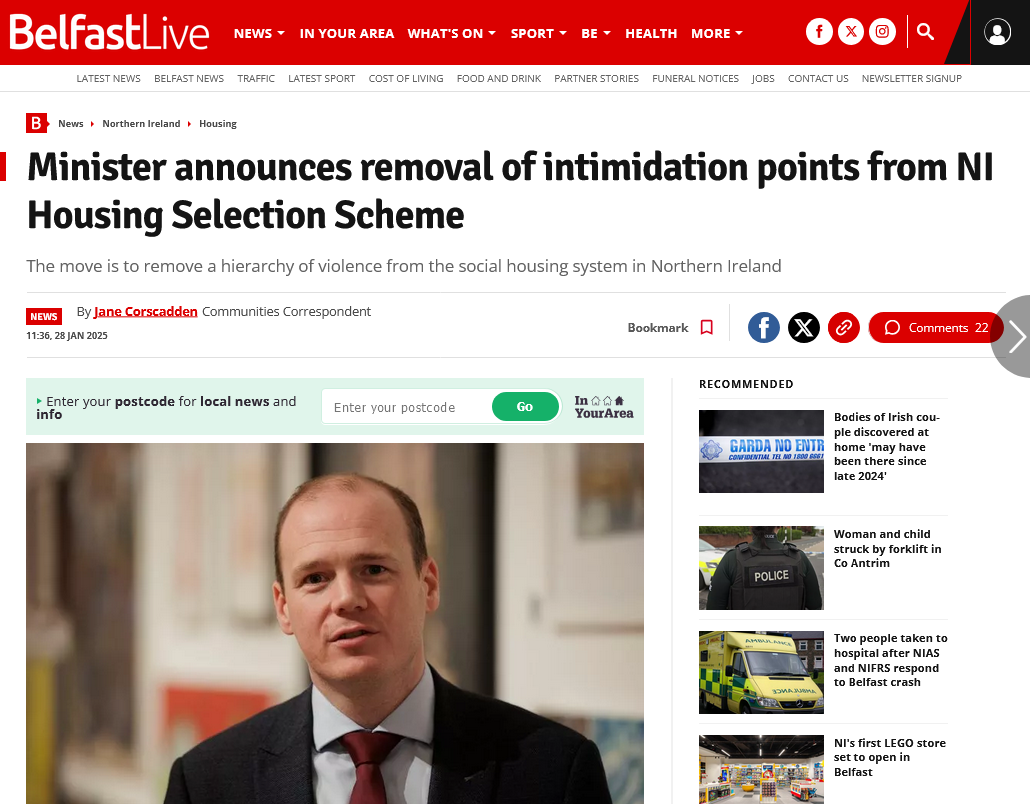The Lyons’ Intervention: intimidation points must be removed before the court case
- On 28th January, a week before the Housing Executive’s court case against the NI Human Rights Commission (NIHRC), Gordon Lyons, the Department for Communities minister, announced that Intimidation Points would be removed from the Housing Selection Scheme.
- On 4th February, the Housing Executive will face the NIHRC in Court. The case seeks to issue a judicial review of the Housing Selection Scheme, due to the NIHRC’s claim that it discriminates against some groups who experience violence and are at a serious and imminent risk of being killed or seriously injured. For example, victims of Domestic Violence are excluded from being allocated Intimidation Points.
- The Housing Executive proposed the removal of intimidation points in 2017; however, the then Department for Communities minister said that they should be expanded instead to be more inclusive of other victims at serious and imminent risk.

What argument is Lyons making in justifying a blanket removal of intimidation points?
- Lyons’ principal argument is that, by withdrawing intimidation points, he is levelling the playing field for all victims of violence.
- There are 20 Primary Social Needs Points that can be allocated: Where the Applicant or a member of the Applicant’s household is experiencing or has experienced violence or is at risk of violence including physical, sexual, emotional or domestic violence or child abuse.
- The same quantity, 20, of Primary Social Needs Points is allocated under the following grounds:
- Where the Applicant or a member of the Applicant’s household is experiencing or has experienced harassment, including racial harassment and there is fear of actual violence (but the criteria for the award of Intimidation points (see paragraph 23) are not met).
- Where the Applicant or a member of the Applicant’s household, is experiencing or has experienced fear of actual violence for another reason and the Applicant is afraid to remain in his / her current accommodation.
- Where the Applicant, or a member of the Applicant’s household, is experiencing or has experienced distress / anxiety caused by recent trauma which has occurred in the Applicant’s current accommodation.
- Where, in the opinion of Social Services, there is a need for re-housing, to prevent the Applicant or a member(s) of the Applicant’s household going into care.
- Where Social Services recommend that the Applicant or a member of the Applicant’s household, move to larger or more suitable accommodation to enable him / her to become or continue to be a foster parent.
- Where families with dependent children are living apart because of overcrowding or tension in previous accommodation, or where living together would result in children living in unsuitable accommodation.
- In circumstances analogous to those listed in sub-paragraphs 1) to 7) above.
- With Intimidation Points removed, all victims of violence can be allocated 20 violence points; from the perspective of the DUP: “the change acknowledges that victims of all forms of violence, harassment or trauma will be treated equally and will be given the same priority within the housing system”
Our position is that the Minister’s argument that his actions are levelling the playing field for victims of violence is fundamentally flawed
- The argument fails to recognise that: 1) not all forms of violence are equal, and 2) equal treatment does not always lead to equal outcomes:
- Coming from the perspective of public organisations and organisations in the Community & Voluntary Sector charged with supporting victims of violence, resources have to be prioritised towards those at greatest risk of serious injury or being killed. And so it should be for social housing: allocations are legislated to be based on need. Intimidation points priortise victims at greater risk.
- Women, who are more likely to experience such a level of violence in the home, could be helped to get out of that situation quicker, through an allocation of intimidation points.
- The failure to discriminate between different levels of violence, and the failure to take into account that women are more likely to experience serious and imminent risk in the home, means that the Minister’s announcement is of no significant benefit to women and others at serious and imminent risk.
- The ‘equal treatment’ of all victims of violence will not lead to equal outcomes for victims at serious and imminent risk. Instead, the equal treatment maintains the same stalemate of comparable risk, now for all such victims.
- Far from leveling the playing field, Lyons’ decision tilts the playing field away from the allocation of housing based on need, and towards a stronger claim that the Housing Selection Scheme discriminates against victims at serious and imminent risk of serious injury or being killed.
- The argument fails to recognise that, through Primary Social Needs points, violence, as an experience, is treated comparably to other circumstances that do not place a person at serious and imminent risk of injury. Victims of these adverse social circumstances are all treated equally. Again, this equal treatment will not lead to better outcomes for those at serious and imminent risk.
The announcement to remove intimidation points is nothing more than a cynical move to avoid accountability for systemically ignoring gender based violence that places women at more serious and imminent risk of serious injury or being killed in the home.
With no evidence/argument to the contrary, we wish the NIHRC well with the trial & hope that, over time, justice is served in revealing systemic discrimination against women, and other victims of intimidation who have not been allocated intimidation points in the past.
Additional Background Information
The pending NIHE vs NI Human Rights Commission court case
- On 4th February, the Housing Executive will face the NI Human Rights Commission (NIHRC) in Court. The case seeks to issue a judicial review of the Housing Selection Scheme, due to the NIHRC’s claim that it discriminates against some groups who experience violence and/or are at a serious and imminent risk of being killed or seriously injured.
- The aim of the Housing Selection Scheme is to allocate housing in proportion to need. The NIHRC’s position is that those who are at a serious and imminent risk of being killed or seriously injured have a greater housing need than those who are not. As a consequence, there should be an allocation of more points, so that an alternative home can be identified more quickly.
- Since 2000, when the Housing Selection Scheme was introduced, 200 intimidation points were available to applicants who satisfied 1 or both of the following criteria:
- The Applicant’s home has been destroyed or seriously damaged (by explosion, fire or other means) as a result of a terrorist, racial or sectarian attack, or because of an attack motivated by hostility because of an individual’s disability or sexual orientation, or as a result of an attack by a person who falls within the scope of the Housing Executive’s statutory powers to address neighbourhood nuisance or other similar forms of anti-social behavior.
- The Applicant cannot reasonably be expected to live, or to resume living in his/ her home, because, if he or she were to do so, there would, in the opinion of the Designated Officer, be a serious and imminent risk that the Applicant, or one or more of the Applicant’s household, would be killed or seriously injured as a result of terrorist, racial or sectarian attack, or an attack which is motivated by hostility because of an individual’s disability or sexual orientation, or as a result of an attack by a person who falls within the scope of the Housing Executive’s statutory powers to address neighbourhood nuisance or other similar forms of anti-social behaviour.
- Gender is not included as an equality-related characteristic, among other factors like nationality. The consequence is that no victims of domestic violence have been allocated Intimidation Points.
- The NIHRC’s position is that the prolonged exclusion of DV- and other victims from access to Intimidation Points is a breach of human rights. Taking gender alone, it is arguably a highly significant example of systemic gender-based discrimination.
- In not taking the serious and imminent risk of being killed or seriously injured into account, for some victims, it means that the Housing Selection Scheme is failing to allocate housing in proportion to need.
Is there anything Minister Lyons could do to change our minds?
- Unlikely.
- He could analyse some data to see if applicants who are allocated Primary Social Needs violences points, but not intimidation points, spend a shorter time on the waiting list for a home compared to applicants with other Primary Social Needs points. Perhaps there is a difference, and victims of violence are sufficiently prioritised with points for housing.
- Given that all Primary Social Needs points carry the same weighting, it is more likely that there is no difference between the two outlined groups.
- We think it’s unlikely that Lyons analysed any data, or made a request for an Equality Impact Assessment to be conducted, given such a significant change in practice.
- Gordon Lyons is welcome to publicly clarify if any analysis did inform his decision, if he wishes to challenge the points we have made above.


